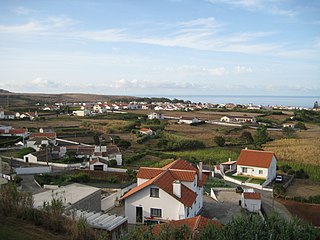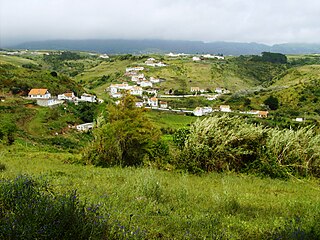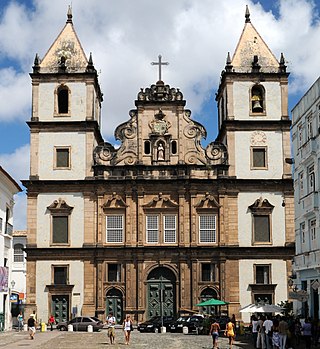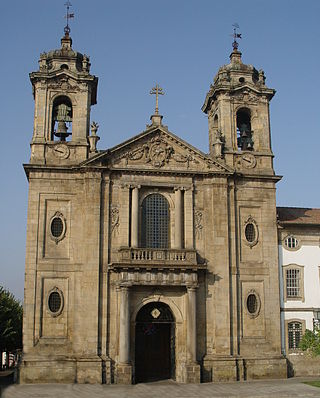
Vila do Porto is the single municipality, the name of the main town and one of the civil parishes on the island of Santa Maria, in the Portuguese archipelago of Azores. Its nearest neighbor, administratively, is the municipality of Povoação on the southern coast of São Miguel, and it is physically southwest of the islets of the Formigas. The population in 2021 was 5,408, in an area of 96.89 km2 (37.41 sq mi).

Santa Cruz das Flores is a municipality situated in the north half of the island of Flores, in the Portuguese archipelago of the Azores. Situated in the sparsely populated Western Group, the population in 2021 was 2,020 inhabitants in an area that covers approximately 70.91 square kilometres (27.38 sq mi), bordering the southern municipality of Lajes das Flores.

Matriz is a freguesia in the municipality of Horta, in the Portuguese Azores, which is part of the urbanized core of the city of Horta. The population in 2011 was 2,562, in an area of 1.81 km². It is the smallest and most populous parish on the island. It contains the localities Matriz and Dutras.

Almeirim is a city and a municipality in Santarém District, Portugal. The population in 2011 was 23,376, in an area of 222.12 km². The city proper had a population of 10,520 in 2001.

Lagoa is a city and municipality in the district of Faro, in the Portuguese region of Algarve. The population of the municipality in 2011 was 22,975, in an area of 88.25 km². Its urban population, in the city of Lagoa proper, is 6,100 inhabitants. An important travel destination, its coast has won numerous accolades. Marinha Beach was considered by the Michelin Guide as one of the 10 most beautiful beaches in Europe and as one of the 100 most beautiful beaches in the world.

Vila do Porto is a civil parish in the municipality of Vila do Porto, located on the island of Santa Maria, in the Portuguese autonomous region of Azores. It is the southernmost and easternmost parish in the archipelago of Azores. The population in 2011 was 3,119, in an area of 25.55 km².

The São Francisco Church and Convent of Salvador is located in the historical centre of Salvador, in the State of Bahia, Brazil. The ornate Church of the Third Order of Saint Francis sits adjacent to the convent. The friars of the Franciscan Order arrived in Salvador in 1587 and constructed a convent and church on the site. This structure was destroyed by the Dutch during the Dutch invasions of Bahia in the next century; Father Vicente das Chagas initiated the current structure in 1686, which was completed in the 18th century. The Franciscan church and convent have the largest number of azulejos, 55,000, of any church in Latin America.

Pópulo Church is a Neoclassical church located in Braga, Portugal. The church has been classified as Property of Public Interest since 1977.

The Convent of São Francisco, originally designated the Convent of Nossa Senhora da Vitória, located in the Largo of Nossa Senhora da Conceição, in the civil parish of Vila do Porto, municipality of the same name on the island of Santa Maria, in the Portuguese in the Azores.

Church of the Magdalene is a church in Lisbon, Portugal. Its portal is classified as a National Monument.

Igreja de São Cristóvão de Rio Mau is a church in Vila do Conde, Portugal. It is classified as a National Monument.

The Convent of São Francisco is a Baroque-era convent and church in the historical centre of the city of Angra, civil parish of Sé, municipality of Angra do Heroísmo on the Portuguese island of Terceira, in the archipelago of the Azores. Better recognizable for the large Church of Our Lady of the Guide, is its locally known as the Igreja do Convento de São Francisco,, one of the largest of Christian temples in the Azores, and former seat of the Franciscan Province of São João Evangelista, during the Age of Discovery.

The Convent of São Boaventura, Convent of Saint Bonaventure, popularly referred to it as the Church of São Francisco, is located in the civil parish of Santa Cruz, in the municipality of the same name in the Portuguese archipelago of the Azores.
The Convent of Beato António is a former Portuguese convent, located in the civil parish of Beato, in the municipality of Lisbon.

The Church of Our Lady of the Angels, more commonly known simply as Igreja dos Anjos[iˈɣɾe(j).ʒɐ duz‿ˈɐ̃.ʒuʃ], is a Roman Catholic parish church located in Lisbon, Portugal.
Vila Nova de Gaia is one of the leading tourism destinations in northern Portugal, located directly opposite Porto, on the South bank of Douro river. These two cities interconnect with each other through several bridges over Douro river. Vila Nova de Gaia is home to several notable attractions, such as the Port wine cellars, Dom Luís I Bridge, the Teleferico, Monastery of Serra do Pilar, Douro Estuary and 18 km long beaches.

St Paul's Cathedral is an Anglican cathedral in Lisbon, seat of the Lusitanian Catholic Apostolic Evangelical Church, which is a member church of the Anglican Communion. It is situated on Rua das Janelas Verdes, in the freguesia of Prazeres.

















